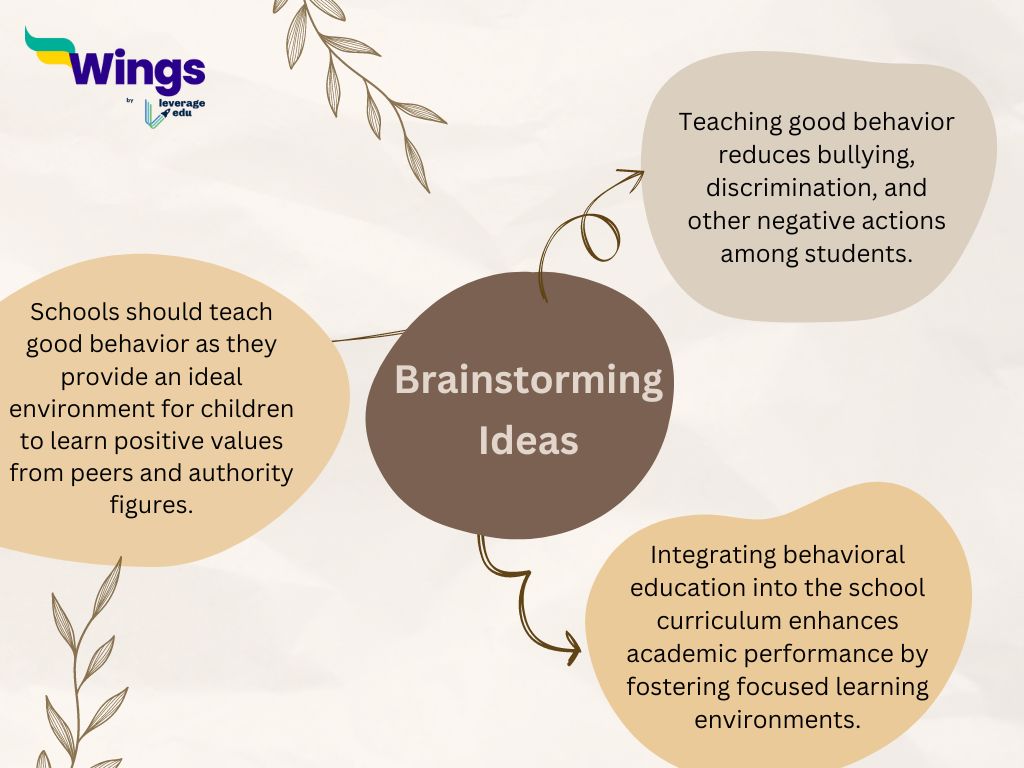Brainstorming Ideas
Reasons for agreeing that it is the responsibility of schools to teach children good behaviour:
- It provides an environment where a child gets to interact with peers and authority figures outside the family which is an ideal platform to instill positive values.
- Teaching students good behaviour can reduce chances of bullying, discrimination and other negative behaviours.
- Integrating behavioural education into the school curriculum enhances academic performance by promoting focused learning environments.

Q. Family history is important to some people. What do you think about people who find out and get to know the previous generation of the family as compared to people who only focus on the current family and future generation?
Ans. Schools play an important role in shaping a child’s character which is essential for their overall development and success in life. While academic knowledge is crucial, it is important to inculcate good behaviour in children as it lays a solid foundation for a harmonious and productive society. I strongly feel that it is the responsibility of the schools to teach their students good behaviour apart from providing formal education.
Firstly, schools serve as a social environment where a child gets to interact with peers and authority figures outside the family. This setting provides an ideal platform for instilling values such as respect, empathy and cooperation. For instance, teachers are the role models of students. So they can reinforce positive behaviour through classroom management strategies and by establishing clear behavioural expectations. By consistently promoting values like punctuality, honesty and responsibility, schools can help students internalise such behaviours, which will benefit them throughout their lives.
Secondly, teaching good behaviour in schools can reduce instances of bullying, discrimination and other negative behaviours. Programs that focus on character building such as anti-bullying campaigns and social-emotional learning (SEL) initiatives, have been shown to improve student’s interpersonal skills and emotional regulation. For example, SEL programs teach students how to manage their emotions, set positive goals and show empathy towards others. These skills are important for creating a safe and supportive school environment where all students can thrive.
Lastly, integrating behavioural education into the school curriculum enhances academic performance by promoting focused learning environments. Students who exhibit good behaviour are more engaged in class activities, have better relationships with peers and teachers, manage their time effectively, and experience reduced stress levels. This positive atmosphere allows teachers to dedicate more time to teaching and less to managing disruptions, thereby maximising learning opportunities and setting students up for long-term academic success.
To conclude, it is essential for schools to integrate the teaching of good behaviour alongside formal education. By fostering a culture of respect, empathy, and responsibility, schools can contribute to the holistic development of their students, preparing them not only for academic success but also for a fulfilling and ethical life.
Analysis
Paraphrased Statement: Schools play an important role in shaping a child’s character which is essential for their overall development and success in life.
Thesis Statement: While academic knowledge is crucial, it is important to inculcate good behaviour in children as it lays a solid foundation for a harmonious and productive society. I strongly feel that it is the responsibility of the schools to teach their students good behaviour apart from providing formal education.
Body Paragraph 1-Topic Sentences: Firstly, schools serve as a social environment where a child gets to interact with peers and authority figures outside the family. This setting provides an ideal platform for instilling values such as respect, empathy and cooperation.
Body Paragraph 1- Supporting Reasons and Explanations: For instance, teachers are the role models of students. So they can reinforce positive behaviour through classroom management strategies and by establishing clear behavioural expectations. By consistently promoting values like punctuality, honesty and responsibility, schools can help students internalise such behaviours, which will benefit them throughout their lives.
Body Paragraph 2- Topic sentence: Secondly, teaching good behaviour in schools can reduce instances of bullying, discrimination and other negative behaviours.
Body paragraph 2- Supporting Reasons and Explanations: Programs that focus on character building such as anti-bullying campaigns and social-emotional learning (SEL) initiatives, have been shown to improve student’s interpersonal skills and emotional regulation. For example, SEL programs teach students how to manage their emotions, set positive goals and show empathy towards others. These skills are important for creating a safe and supportive school environment where all students can thrive.
Body Paragraph 3- Topic sentence: Lastly, integrating behavioural education into the school curriculum enhances academic performance by promoting focused learning environments.
Body paragraph 3- Supporting Reasons and Explanations: Students who exhibit good behaviour are more engaged in class activities, have better relationships with peers and teachers, manage their time effectively, and experience reduced stress levels. This positive atmosphere allows teachers to dedicate more time to teaching and less to managing disruptions, thereby maximising learning opportunities and setting students up for long-term academic success.
Conclusion: To conclude, schools need to integrate the teaching of good behaviour alongside formal education. By fostering a culture of respect, empathy, and responsibility, schools can contribute to the holistic development of their students, preparing them not only for academic success but also for a fulfilling and ethical life.
Vocabulary in Use
| Word | Meanings |
| Inculcate | To instill an idea, habit, or attitude by persistent instruction. |
| Instilling | Gradually but firmly establishing an idea or attitude in someone’s mind. |
| Reinforce | To strengthen or support an idea, behavior, or structure. |
| Exhibit | To display or show something openly. |
| Disruptions | Interruptions or disturbances that hinder normal processes or activities. |
| Holistic Development | Comprehensive growth considering all aspects of an individual’s life, including physical, mental, emotional, and social factors. |
Linkers and Connectors Used
Following are the linkers and connectors used:
- Firstly
- For instance
- Secondly
- For example
- Lastly
- Furthermore
- To conclude
Are you preparing for IELTS? Check out this video to improve your writing skills for the IELTS exam given below👇.
Download the Leverage IELTS App today.


Need help preparing for IELTS? Check out the best IELTS preparation courses in the market offered in a live training environment.


 One app for all your study abroad needs
One app for all your study abroad needs












 60,000+ students trusted us with their dreams. Take the first step today!
60,000+ students trusted us with their dreams. Take the first step today!